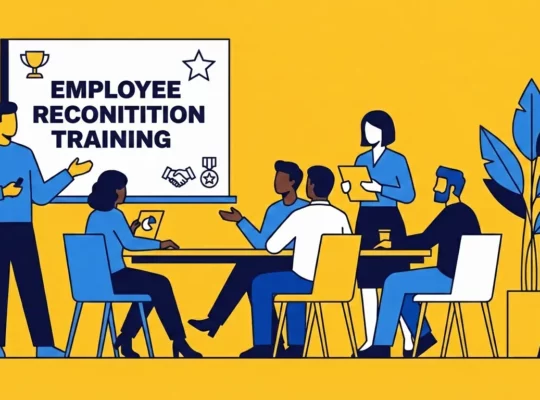Summary
This comprehensive guide explores actionable strategies for improving employer branding, a critical aspect of attracting and retaining top talent in today’s competitive job market. It delves into understanding employer branding, assessing current employer brand positioning, developing a compelling Employer Value Proposition (EVP), leveraging employee advocacy, utilizing social media, creating a positive candidate experience, fostering an inclusive company culture, and continuously updating employer branding strategies. The guide emphasizes the importance of authenticity, employee engagement, and strategic adaptation to maintain a strong employer brand.
Table of Contents:
- Article Summary
- Understanding Employer Branding
- Assessing Your Current Employer Brand
- Developing a Strong Employer Value Proposition (EVP)
- Enhancing Your Employer Brand Through Employee Advocacy
- Leveraging Social Media and Digital Platforms
- Creating a Positive Candidate Experience
- Fostering an Inclusive and Engaging Company Culture
- Continuously Monitoring and Updating Your Employer Branding Strategy
- Final Thoughts
- FAQs
In today’s competitive job market, attracting and retaining top talent is paramount for organizational success. Employer branding, the strategic process of shaping and promoting a company’s image and reputation as an employer, plays a pivotal role in achieving this goal. This guide delves into actionable strategies to elevate your employer brand and captivate potential candidates.
Understanding Employer Branding
What is employer branding and why is it essential?
Employer branding transcends mere candidate attraction. It involves crafting a compelling narrative that showcases your company’s values, culture, and employee experience, setting you apart from competitors and forging a connection with both potential and current employees. A robust employer brand yields numerous benefits:
Attracts Top Talent
A strong employer brand acts as a magnet, drawing in highly skilled and qualified individuals who are eager to contribute to your organization’s success. For instance, companies like Google and Netflix are renowned for their innovative cultures and exceptional employee benefits, which consistently attract top performers.
A strong employer brand can lead to a 50% increase in the number of qualified candidates
Source: withe.co
Reduces Hiring Costs
When your company is recognized as a desirable workplace, candidates will naturally gravitate towards you, reducing the need for costly recruitment methods like advertising and headhunting. This organic attraction can significantly lower your cost per hire.
Improves Employee Engagement and Retention
Employees who resonate with your company’s values and feel valued are more engaged, productive, and likely to stay long-term. This translates into lower turnover costs, increased institutional knowledge, and a more stable and successful organization. Companies with high employee engagement consistently outperform their competitors in terms of customer satisfaction and profitability.
Boosts Company Reputation and Customer Perception
A positive employer brand extends beyond attracting talent; it also enhances your overall image and attracts customers who value ethical employee treatment. Studies have shown that companies with strong employer brands tend to have higher customer loyalty and brand advocacy.
Provides a Competitive Advantage
In a crowded job market, a strong employer brand serves as a key differentiator. Companies known for offering a fulfilling employee experience are better positioned to attract and retain top talent, giving them a competitive edge in the war for talent.
Assessing Your Current Employer Brand
Building a strong employer brand doesn’t happen overnight. It requires a strategic approach, and the first step in that journey is understanding where you currently stand. Just as a sculptor needs to assess their raw material before carving, you need to evaluate your existing employer brand positioning before implementing improvements. This self-evaluation allows you to identify your strengths and weaknesses, set realistic goals, and tailor your strategy for maximum impact. To evaluate your current employer brand positioning, consider the following steps:
Conduct Employee Surveys
Gather candid feedback from your employees about their experiences and perceptions of the company culture. This can be done through anonymous surveys, focus groups, or one-on-one conversations.
Analyze Online Reviews and Social Media Mentions
Monitor review platforms to understand how your company is perceived by the outside world. Pay attention to both positive and negative feedback, and identify recurring themes.
Benchmark Against Competitors
Research how other companies in your industry are approaching employer branding. Analyze their career pages, social media presence, and employee reviews to identify best practices and areas where you can differentiate yourself.
Identify Your Strengths and Weaknesses
Based on your research, determine which aspects of your employer brand are resonating with candidates and where there is room for improvement. This self-assessment will help you focus your efforts on the areas that will have the greatest impact.
Utilize Metrics
Utilize metrics such as employee engagement scores, turnover rates, and brand awareness to quantify your employer brand’s effectiveness. These metrics will provide valuable data points to track your progress and measure the impact of your employer branding initiatives.
Developing a Strong Employer Value Proposition (EVP)
Imagine trying to sell a product without highlighting its unique features and benefits. It wouldn’t be very effective, would it? The same principle applies to attracting talent. Your Employer Value Proposition (EVP) is the cornerstone of your employer brand, acting as a magnet to draw in the right candidates. It clearly articulates the unique benefits and rewards employees receive in exchange for their contributions.
But simply having an EVP isn’t enough. To truly stand out in today’s competitive talent market, your EVP needs to be compelling. It needs to resonate with your target audience and showcase what makes your company a truly exceptional place to work. To develop a strong Employer Value Proposition:
Identify What Matters to Your Employees
Go beyond superficial perks and delve into what employees value most about working at your company. This could include factors like career growth opportunities, work-life balance, a sense of purpose, or a positive and supportive work environment.
Highlight Unique Offerings
Differentiate your company from competitors by emphasizing specific benefits, cultural aspects, or opportunities that set you apart. For example, if your company offers unlimited vacation days or has a strong commitment to sustainability, these are unique selling points that can attract potential employees.
Ensure Authenticity
Your EVP should accurately reflect the genuine employee experience at your company. Avoid making exaggerated claims or promises that you cannot keep. Authenticity is key to building trust and credibility with candidates.
Enhancing Your Employer Brand Through Employee Advocacy
Your employees are more than just workers; they are your most authentic and influential brand advocates. Their voices carry weight, and their stories have the power to shape public perception of your company. When employees are engaged and satisfied, they naturally become champions for your brand, attracting top talent and boosting your overall reputation.
As an employer, you can encourage employee advocacy by:
- Creating a positive work environment: Employees are more likely to speak highly of a company where they feel valued, respected, and engaged. This includes fostering a culture of open communication, collaboration, and recognition.
- Providing opportunities to share stories: Encourage employees to share their positive experiences on social media, internal communication platforms, and through testimonials. This could involve creating employee-generated content campaigns or simply providing guidelines and support for employees who want to share their stories.
- Recognizing and rewarding advocacy: Show appreciation for employees who actively promote your employer brand. This could involve public recognition, small tokens of appreciation, or even financial incentives.
Leveraging Social Media and Digital Platforms
Social media and digital platforms are powerful tools for reaching and engaging with potential candidates. To reach that end result, you can follow these recommendations:
Create Engaging Content
Share compelling stories, photos, and videos that showcase your company culture, employee experiences, and values. This content should be authentic, relatable, and provide a glimpse into what it’s like to work at your company.
Interact with Your Audience
Actively respond to comments and questions on social media, participate in industry discussions, and build relationships with potential employees. This demonstrates that you are engaged and interested in connecting with talent.
Run Targeted Campaigns
Use social media advertising to reach specific talent segments with tailored messaging. This allows you to focus your efforts on the candidates who are most likely to be a good fit for your organization.
Creating a Positive Candidate Experience
The candidate experience is a crucial, yet often overlooked, aspect of employer branding. Every interaction a potential employee has with your company, from browsing your career page to the final interview stage, shapes their perception of your brand. A negative experience can deter top talent and damage your reputation, while a positive one can leave a lasting impression and attract the best and brightest. You can improve the candidate experience by:
Streamlining the Application Process
Make it easy and efficient for candidates to apply for jobs at your company. This includes having a user-friendly online application system and providing clear instructions.
Providing Clear and Timely Communication
Keep candidates informed throughout the hiring process, even if they are not selected for the role. This includes providing updates on the status of their application and timely responses to any inquiries.
Offering Feedback to All Candidates
Even rejected candidates should receive constructive feedback to help them improve their future applications. This demonstrates that you value their time and effort.
Treating Candidates with Respect and Professionalism
Create a positive impression throughout the hiring process, regardless of whether the candidate is ultimately hired. This includes being courteous, responsive, and transparent.
Fostering an Inclusive and Engaging Company Culture
Imagine a workplace where everyone feels valued, respected, and empowered to contribute their best. This isn’t just a utopian dream; it’s the reality of a company with a thriving, inclusive, and engaging culture. Such a culture serves as the cornerstone of a strong employer brand, attracting diverse talent and fostering an environment where employees can flourish.
Clearly Define and Communicate Your Values
Ensure that your company’s core values are well-defined, understood, and consistently communicated to all employees. This creates a sense of shared purpose and helps employees understand what is expected of them.
Promote Diversity and Inclusion
Create a workplace where everyone feels valued and respected, regardless of their background, identity, or beliefs. This includes implementing diversity and inclusion initiatives, fostering a culture of open communication, and addressing any biases or discrimination.
Empower Employees
Give employees a voice in decision-making, encourage collaboration, and provide opportunities for growth and development. Empowered employees feel more engaged and invested in their work.
Celebrate Successes and Recognize Contributions
Foster a culture of appreciation and recognition to boost employee morale and engagement. This could involve public recognition, team celebrations, or even financial rewards.
Continuously Monitoring and Updating Your Employer Branding Strategy
Building a strong employer brand isn’t a one-time effort; it’s an ongoing journey that requires constant attention and adaptation. Just as the business landscape evolves, so too must your employer branding strategy. You can ensure that your employer brand remains relevant, attractive, and impactful by following the recommendations below:
Regularly Assess Your Employer Brand
Conduct employee surveys, analyze key metrics, and monitor online conversations to identify areas for improvement and track your progress.
Adapt to Evolving Workforce Trends
Stay informed about changing employee expectations and adapt your strategy accordingly. This could involve incorporating new benefits, flexible work arrangements, or a stronger focus on purpose-driven work.
Use Tools Like Review.jobs
Leverage platforms like Review.jobs to gather authentic employee feedback, showcase your company culture, and analyze your Net Promoter Score (NPS). These platforms can provide valuable insights and help you reach a wider audience of qualified talent.
Final Thoughts
Investing in employer branding is a strategic decision that can yield significant long-term benefits. By implementing the strategies outlined in this guide, you can cultivate a strong and attractive employer brand that attracts, engages, and retains top talent, ultimately taking your organization towards growth and success. Remember, employer branding is an ongoing journey that requires continuous effort and adaptation. By prioritizing employee experience and actively managing your employer brand, you can create a workplace that employees are proud to be a part of and that attracts the best and brightest in your industry.
FAQs
Why is Employer Branding Important for a Company?
A strong employer brand offers numerous benefits, including:
- Attract top talent: A positive reputation makes your company more desirable to high-quality candidates, leading to a larger pool of qualified applicants.
- Reduce hiring costs: A strong employer brand can decrease cost per hire by attracting more candidates organically and reducing reliance on expensive recruitment methods.
- Improve employee retention: Employees who are proud of their company and its values are more likely to stay, reducing turnover and its associated costs.
- Boost employee engagement: A positive work environment fostered by a strong employer brand leads to more engaged and productive employees.
- Enhance brand reputation: A good employer brand spills over to your overall brand image, attracting not just talent but also customers and investors.
What Role Does Company Culture Play in Enhancing Employer Branding?
Company culture is the foundation of a strong employer brand. A positive and supportive culture translates into:
- Authentic employee experiences: Employees become brand ambassadors, sharing their positive experiences and attracting others.
- Stronger employer value proposition: A unique and positive culture differentiates your company from competitors and attracts talent aligned with your values.
- Increased employee satisfaction and loyalty: Employees who feel valued and engaged are more likely to stay and contribute positively.
- Improved brand authenticity: A genuine culture resonates with potential employees, building trust and credibility.





